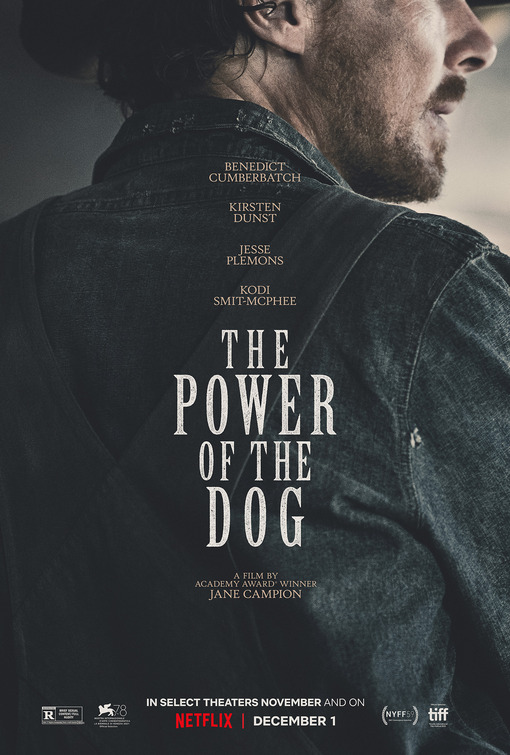THE POWER OF THE DOG (NETFLIX) (2021) |
|
SYNOPSIS: Charismatic rancher Phil Burbank inspires fear and awe in those around him. When his brother brings home a new wife and her son, Phil torments them until he finds himself exposed to the possibility of love.
MOVIE REVIEW:
“Deliver my soul from the sword, my darling from the power of the dog,” pleads the writer of the Biblical Psalm 22, traditionally thought to be David, when beset by dangers. It is a cry to God for help, though whose soul it is that needs saving or whose darling it is that the movie is referring to remains a mystery right up till the very end.
Adapted from the 1967 novel by Thomas Savage, ‘The Power of the Dog’ is a gripping tale of toxic masculinity, reflected in the film’s enigmatic leading man Phil Burbank (Benedict Cumberbatch). When we first meet Phil, he is your typical hardened cowboy: he’s unbathed; he picks a banjo and castrates bull calves using a blade he then holds in his teeth so he can finish the procedure with his bare hands; and he makes no apologies for calling his timid brother George (Jesse Plemons) ‘fatso’.
Nowhere is Phil’s casual cruelty more evident than during a cattle drive that brings both brothers into the inn of the fragile widow Rose (Kirsten Dunst) and her delicately weedy son Peter (Kodi Smit-McPhee). At dinner, when he finds out that it was Peter who had folded the paper flowers that adorn the table, Phil teases the boy without any remorse. Though Rose eyes Phil with both fear and hatred, she cannot help but be taken by George, and soon after, moves from the small-town boarding house where she has been working as a cook into the Burbank family ranch in Montana.
Over the course of an unhurried two hours, the New Zealand-born auteur Jane Campion (best known for her 1992 Academy-Award winning ‘The Piano’) lets the story unspool in chapters, shifting subtly from a relationship drama to a study of Phil’s wounded character.
The middle act sees Phil insidiously and methodically torture Rose, be it mocking her mediocre skills after George encourages her to practice the piano by getting her a grand instrument in the house or taunting her after catching her secretly taking sips of bourbon in the alley behind the house. Rose’s victimization and decline also establishes Phil as the villain of the piece, and Campion uses these scenes to draw out our own biases and prejudices.
As difficult as the set-up may be to watch, it is both necessary and rewarding by the time Peter arrives at the ranch during a break from his medical studies. Contrary to expectation, Phil takes the boy under his wing, seeing an opportunity to mold someone new in his own image, just as his former mentor, the late Bronco Henry, had done with him. To say anything more would be to give too much away, so let’s just say the story deepens in ways that are both revelatory and unexpectedly poignant; in particular, it is fascinating to watch how Peter and Phil explore, define and navigate their ambiguous bond, not least given how it affects those around them, especially Rose.
It does demand a fair amount of patience and attention from its viewer, but Campion’s film rewards those who do with a stunning pay-off both obvious and ingenious. Indeed, part of the joy comes from not knowing where Campion’s storytelling is leading you, and after arriving at the destination, realizing how it was seeded all along. Oh yes, those who decide to embark on a second watch will discover more of its brilliant subtlety, and marvel even more at the achievement of Campion’s filmmaking.
There is method in the way Campion frames the entire story, aided by Ari Wegner’s exquisite cinematography. Together, they bring the vast, treacherous landscape of the mountainous West (with New Zealand standing in for Montana) into lurid focus, contrasting it against the doom and endangerment within the Burbank household through claustrophobic close-ups. Campion is in superb control of the film’s mood, tone and pacing through every aspect of its craft, including the nervous rhythms of Jonny Greenwood’s score and the detailed sets of Grant Major’s production design.
It is equally her achievement that she manages to draw out a career-best performance by Cumberbatch, who truly gets beneath the snarling bravado of his character to showcase Phil’s vulnerabilities. After a recent string of roles as either historical intellectuals or magical superheroes, Cumberbatch displays a terrifying new dimension as an actor balancing menace and deeply hidden grace in such powerful and persuasive ways. He is also well-matched by Smit-McPhee, as they engage in a push-pull dynamic that is riveting to watch.
Whether it comes off winning Best Picture at this year’s Academy Awards (even as it has been lauded as a frontrunner), ‘The Power of the Dog’ is no lesser a potent piece of filmmaking from a director at the top of her game. Though set in the 1920s, its depiction of male ego and masculinity is just as relevant today, with a leading act by Cumberbatch that will resonate through the ages. Whatever preconceptions you might have about it, you’ll likely find yourself pleasantly surprised by how the film subverts them with complexity and nuance in deliberate, measured fashion. Give yourself the time and space to enjoy this gem – we guarantee it will be worth your while..
MOVIE RATING:





Review by Gabriel Chong
 |
|
|
|
